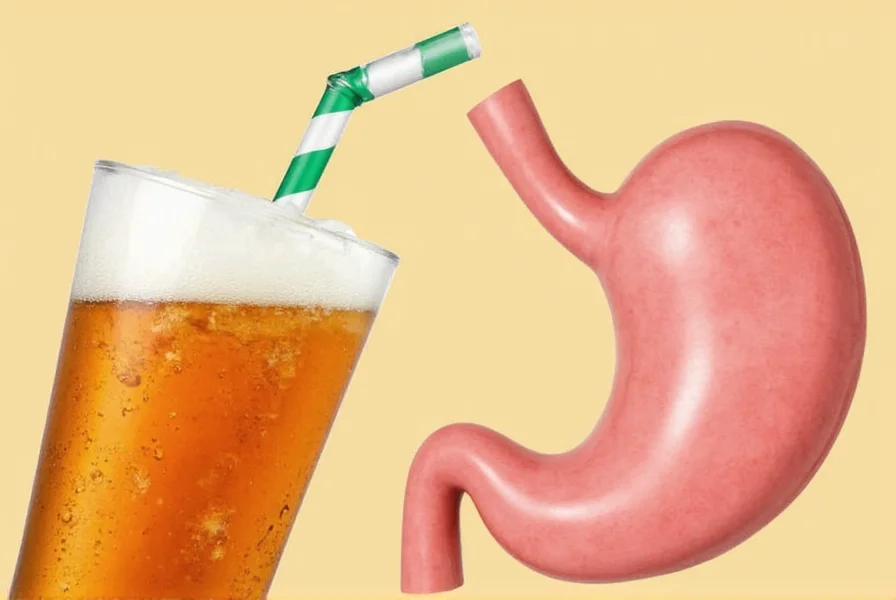When your stomach feels unsettled, reaching for ginger ale seems like a natural remedy. But does this popular beverage actually work, or is it just an old wives' tale? Understanding the science behind ginger's effects on digestion helps separate fact from fiction when treating stomach discomfort.
The Science Behind Ginger and Digestion
Ginger contains bioactive compounds called gingerols and shogaols that interact with your digestive system in several beneficial ways. These compounds help reduce inflammation in the gastrointestinal tract and accelerate gastric emptying, which can alleviate feelings of nausea and bloating.
Multiple clinical studies support ginger's effectiveness for nausea relief. A 2020 review published in Nutrients analyzed 13 clinical trials and concluded that ginger significantly reduces nausea severity compared to placebo, particularly for pregnancy-related nausea and chemotherapy-induced nausea. The review noted that doses of 1-1.5 grams of ginger daily produced the most consistent results.

Ginger Ale vs. Pure Ginger: What's the Difference?
Most commercial ginger ales contain surprisingly little actual ginger. Instead, they rely on artificial ginger flavoring and high amounts of sugar or sweeteners. This creates two problems for upset stomach relief:
| Component | Commercial Ginger Ale | Pure Ginger Products |
|---|---|---|
| Actual ginger content | 0.1-0.5% (mostly artificial flavor) | 100% natural ginger |
| Sugar content (per 12oz) | 30-40g | 0-5g (depending on preparation) |
| Active ginger compounds | Minimal | High concentration |
| Carbonation | High (may cause bloating) | None |
The high sugar content in most ginger ales can actually worsen stomach issues for some people, particularly those with irritable bowel syndrome or diabetes. Additionally, the carbonation that gives ginger ale its fizz may cause bloating and gas, counteracting any potential benefits from the small amount of ginger present.
How to Use Ginger Ale for Upset Stomach: Best Practices
If you choose to use ginger ale for stomach relief, follow these evidence-based recommendations:
- Choose brands with real ginger: Look for products listing ginger root extract or ginger juice among the first ingredients. Canada Dry and Schweppes contain minimal actual ginger, while brands like Reed's and Vernors have higher ginger content.
- Let it go flat: Pour your ginger ale into a glass and let it sit for 10-15 minutes to release some carbonation, which reduces potential bloating.
- Sip slowly: Consume 2-4 ounces every 15-20 minutes rather than drinking a full glass at once.
- Chill but don't ice: Cold temperatures can help settle the stomach, but extremely cold beverages may trigger spasms in sensitive digestive systems.
For children with upset stomachs, consult a pediatrician before using ginger ale. The American Academy of Pediatrics recommends oral rehydration solutions rather than sugary sodas for children with vomiting or diarrhea.
Better Alternatives to Commercial Ginger Ale
For more reliable upset stomach relief, consider these alternatives that provide higher concentrations of active ginger compounds:
Fresh Ginger Preparations
Peel and slice 1-2 inches of fresh ginger root, then steep in hot water for 10-15 minutes to make potent ginger tea. Add a squeeze of lemon and a small amount of honey if desired. This preparation contains significantly more active compounds than most commercial ginger ales.
Ginger Supplements
Ginger capsules standardized to contain 5% gingerols provide consistent dosing. Look for products offering 250-500mg doses, which align with amounts used in clinical studies for nausea relief.
Homemade Ginger Ale
You can make your own ginger ale with higher ginger content and less sugar:
- Peel and grate 2 inches of fresh ginger
- Boil with 2 cups water for 10 minutes
- Strain and add 2-3 tablespoons honey or maple syrup
- Cool, then mix with sparkling water (1:1 ratio)
- Refrigerate for 1 hour before serving

When Ginger Ale Won't Help (And What To Do Instead)
Ginger ale provides limited relief for certain stomach issues. It generally won't help with:
- Severe abdominal pain that comes in waves
- Blood in vomit or stool
- Symptoms lasting more than 48 hours
- Fever above 101°F (38.3°C)
- Signs of dehydration (dark urine, dizziness)
These symptoms require medical attention rather than home remedies. If your upset stomach persists beyond 24-48 hours or includes severe symptoms, consult a healthcare provider to rule out serious conditions like appendicitis, gallstones, or infections.
Common Misconceptions About Ginger Ale and Stomach Issues
Several myths persist about ginger ale and digestive health:
Misconception: All ginger ale contains significant amounts of real ginger.
Reality: Most mainstream brands use artificial flavoring with minimal actual ginger content.
Misconception: The carbonation in ginger ale helps settle your stomach.
Reality: Carbonation often causes bloating and gas, potentially worsening stomach discomfort.
Misconception: Ginger ale works equally well for all types of nausea.
Reality: Ginger shows strongest evidence for pregnancy-related nausea and chemotherapy-induced nausea, with more variable results for other causes.
Practical Tips for Maximum Relief
For the best results when using ginger for upset stomach:
- Start with small amounts (1-2 teaspoons of ginger tea or 1-2 ounces of ginger ale)
- Wait 15-20 minutes before consuming more to assess tolerance
- Avoid eating solid foods until nausea subsides
- Stay hydrated with small sips of clear fluids
- Rest in an upright position rather than lying flat
Remember that individual responses to ginger vary. Some people experience significant relief, while others notice little effect. If ginger doesn't help your symptoms after 2-3 doses, try alternative remedies or consult a healthcare provider.
Frequently Asked Questions
Does ginger ale really help with nausea?
Ginger ale can help with mild nausea if it contains sufficient real ginger, but most commercial brands have minimal actual ginger and high sugar content. Pure ginger products like fresh ginger tea provide more reliable nausea relief due to higher concentrations of active compounds. Research shows ginger itself is effective for nausea, but the benefits depend on the ginger content in the beverage.
What's the best ginger ale for upset stomach?
Choose ginger ales that list ginger root extract or ginger juice among the first ingredients. Brands like Reed's Extra Ginger and Vernors contain more actual ginger than mainstream options like Canada Dry. For maximum benefit, look for products with at least 0.5% real ginger content and lower sugar levels. Alternatively, making homemade ginger ale with fresh ginger provides the highest concentration of active compounds.
How much ginger ale should I drink for an upset stomach?
Sip 2-4 ounces of ginger ale slowly every 15-20 minutes rather than drinking a full glass at once. Let the beverage go flat by pouring it into a glass first to reduce carbonation, which can cause bloating. Most people find relief with 8-12 ounces total, but individual tolerance varies. If symptoms persist after 1-2 hours, try alternative remedies or consult a healthcare provider.
Is ginger ale good for stomach flu?
Ginger ale provides limited relief for stomach flu symptoms. While ginger may help with nausea, the high sugar content in most ginger ales can worsen diarrhea, and carbonation may increase bloating. For stomach flu, oral rehydration solutions are more effective for preventing dehydration. If using ginger ale, choose low-sugar varieties and let it go flat before drinking small amounts.
Can children drink ginger ale for upset stomach?
Consult a pediatrician before giving ginger ale to children with upset stomachs. The American Academy of Pediatrics recommends oral rehydration solutions rather than sugary sodas for children with vomiting or diarrhea. If ginger is appropriate, small amounts of diluted ginger tea (1/4 to 1/2 teaspoon of fresh ginger steeped in 8 ounces of water) are generally safer than commercial ginger ale for children over 2 years old.











 浙公网安备
33010002000092号
浙公网安备
33010002000092号 浙B2-20120091-4
浙B2-20120091-4